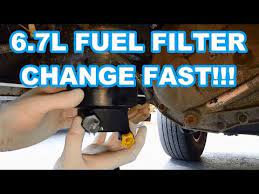How Often to Change Diesel Fuel Filter
Diesel fuel filters are designed to keep your diesel vehicle clean by filtering out microscopic bits of soot from its fuel. If these pieces make their way past the filter, they could clog your engine and lead to irregular idling and difficult starting.
Most vehicles should have their fuel filters replaced every 10,000 to 25,000 miles. To learn more, consult your owner’s manual or reach out to Wayne’s Automotive Center now!
1. Check Your Owner’s Manual
A diesel fuel filter serves an important purpose; preventing debris from entering an engine and clogging its internal components. A clogged filter may lead to engine sputtering and death – potentially dangerous on steep hills or at high speed.
To avoid potential problems, it is recommended that fuel filters be changed according to manufacturer recommendations. Your owner’s manual typically provides this schedule. Failing to adhere to it may lead to issues with vehicle performance.
Most diesel systems feature two fuel filters – a primary and a secondary one between the fuel tank and pump, providing initial filtering of the fuel, before being sent on its journey into the engine combustion chamber. Replacing filters is a straightforward task that can easily be completed at home; just ensure that engine is turned off before opening it! Changing them out is also straightforward with all necessary precautions taken prior to changing out new filters.
2. Drive in Moderate Conditions
Fuel filters are designed to remove impurities from fuel before it enters your engine, such as dirt, debris, water or any other impurities present in it. As driving conditions fluctuate and sediment accumulates over time in your tank and eventually infiltrates either your filter or injectors, a filter may need to catch it all before sending fuel through to your engine.
Even with regular maintenance, diesel fuel filters may still last only for a limited amount of time due to contaminant buildup that prevents it from flowing smoothly. If your vehicle experiences extended driving conditions where the air quality falls short of ideal, changing out your filter more frequently may be necessary.
Your owner’s manual should contain guidelines on when and how often to change your fuel filter, and it’s vitally important that you adhere to them to ensure that your diesel fuel filter continues working effectively without becoming clogged up, potentially leading to engine and injector damage over time. Wayne’s Automotive Center offers testing services if you are concerned about its condition.
3. Avoid High Temperatures
Before diesel fuel enters your engine, it must pass through a filter to filter out impurities. As cold weather approaches, it is wise to change out your filter as soon as possible in order to prevent paraffin wax, an organic substance in diesel fuel that freezes over, from blocking filters and starving your engine of essential fuel.
To prevent this from happening, first drain the old filter before replacing it. You can do this by opening the bleed screw and placing a pan underneath to catch any diesel that comes pouring out. Furthermore, placing oil absorbent pads beneath the filter could help prevent spills.
If your diesel fuel filter is draining improperly, this could be caused by either an incorrectly installed O-ring on its cap or a leaky valve stem seal. After taking out your old filter, make sure that when installing the new one that the O-ring on its filter cap has been thoroughly cleaned before seating it against its ridge all around its housing.
4. Avoid Dirty Fuel
Diesel fuel filters remove dirt, debris and contaminants from fuel before it reaches your engine’s injectors. When they become clogged up with debris or contaminants, this could starve injectors of clean fuel leading to hard acceleration or even stalling issues in your engine.
Many diesel vehicles utilize two fuel filters; one between the tank and engine to provide initial cleaning before passing through a transfer pump and into your diesel engine, and another near it to provide secondary filtering of debris and dirt that clogs both filters, restricting flow. Both may become clogged with debris over time and limit fuel delivery to your injection system.
When changing diesel fuel filters, make sure an oil drain pan is underneath them to minimize any spillage or mess. Use an Allen wrench or hex tool to loosen the filter housing plug so old filter materials and fuel can drain out from under it; replace both with new parts; refill your system with fresh diesel fuel before refilling your system again.




Post Comment